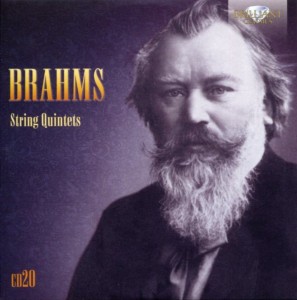In other words, it’s back to bland for Brahms.
This music is nothing like the boldness of yesterday’s. It sounds pretty much like everything else I’ve heard from Brahms.
Only more so.
For example, Movement II (“Grave ed appassionato – Allegretto vivace – Tempo I – Presto – Tempo I”) from String Quartet No. 1 in F Op. 88 sounds like five instruments are warming up, each playing something slightly different. In that regard, it’s almost like progressive rock or Jazz. It’s busy.
But the ending to Movement II is remarkable. Absolutely compelling. Mesmerizing. Magical.
Today’s musicians are:
Brandis Quartett
Thomas Brandis, Peter Brem violins
Wilfried Strehle viola
Wolfgang Boettcher cello
Brett Dean viola
And this is what they’re playing:
String Quartet No. 1 in F Op. 88
According to its entry on Wikipedia:
Johannes Brahms’ String Quintet No. 1 in F major, op. 88, was composed in 1882 in the spa town of Bad Ischl, Upper Austria, and published by the firm of Fritz Simrock. It was first performed at a chamber music evening in Frankfurt-on-Main on 29 December 1882.
Brahms described the quintet to his friend Clara Schumann as “one of [his] finest works” and told Simrock, “You have never before had such a beautiful work from me.”
I’m sure he did describe this work in glowing terms to Clara. He was trying to woo her. He’d have told her God Almighty visited him one bright morning and handed him the manuscript if he thought it would have gotten him into her pants.
I will tell you straight out that this isn’t as special as Brhams thinks it is. It’s busy. Lots going on. Some of it is pleasant and intriguing. The rest is just like everything else he’s composed: bloated. And tame.
HOWEVER…
There are some parts of Movement I (“Allegro non troppo, ma con brio”) that are stunning. Just flashes, really. Like from 3:00 until about 4:00. There are parts of that one-minute chunk that I find riveting.
But Brahms doesn’t seem to write at length in those terms, using that musical language. I only hear snippets of brilliance from time to time. When I hear it, it’s profound. But there’s no enough of it for me to be consistently wowed by Brahms.
Beethoven, by way of contrast, filledl my soul with just a few notes. Entire movements, entire symphonies, were chock-full of magic.
To each his own, eh?
String Quartet No. 2 in G Op. 111
According to its entry on Wiki:
Johannes Brahms’ String Quintet No. 2 in G major, Opus 111 was published in 1890. It is known as the Prater Quintet.
Like Brahms’ earlier string quintet, Opus 88, it is a viola quintet, scored for two violins, two violas and cello. The work has four movements.
Brahms was 57 when he composed String Quartet No. 2.
Between the two compositions on today’s CD, I prefer the second – String Quartet No. 2 in G.
Why?
Why are there stars in the heavens?
I don’t know. Something about it is more compelling to me.

